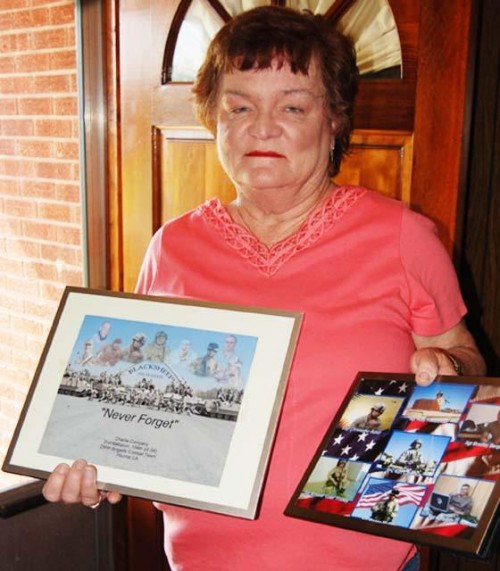Eugenie "Ann" Wise Boulet
April 2, 2008Getting fit for the beach; good books to take along
April 4, 2008So much of the war in Iraq is told through the numbers.
Five years in. 4,011 American casualities. Unknown thousands of terrorists and civilians killed. Zero weapons of mass destruction.
The numbers that hit closer to home are these: Seventy-seven soldiers from Louisiana have made the ultimate sacrifice for their country and seven came from the Tri-parish area.
But numbers are abstract. War is a human endeavor, no matter how inhumane it can get.
Military commanders, politicians, pundits and the public give their assessment of the conflict daily. Front-line soldiers rarely do.
“We do a lot of good over there,” said Sgt. Jeremy Ryles, 28, of New Iberia, describing his tour in Iraq as a member of the Louisiana National Guard 2nd Battalion, 156th Infantry Brigade.
“Unfortunately, it does come at a price.”
Black Sheep is the name given to the unit, but there is nothing unsavory about the men who comprise it.
They helped reopened schools, brought running water to places that never before had such a luxury, and provided security for Iraq’s first free and fair elections.
“I saw 1,000 people walk 10 miles to go vote because they had the right to vote without fear,” said Sgt. Jeremy Bergeron, 29, from Raceland, another member of the Black Sheep.
However, the unit would pay heavily for the Iraqis newfound freedom.
Unlike previous prolonged wars, Americans today who are not serving or have a family member serving are not as connected to the day-to-day impact of war.
That changed in the Tri-parish area on Jan. 6, 2005.
That day, seven members of the unit were killed when their Bradley fight vehicle was hit by a roadside bomb. The explosion was powerful enough to uplift the 30-ton machine, blow the back half off, and kill the men on impact.
“I was behind their convey in a two-man recon patrol,” recalled Sgt. Bergeron, not going further into details.
Sgt. Ryles was attached to another unit at time, but the grim news got back quick.
Four of the seven fallen heroes came from the area: Sgt. 1st Class Kurt J. Comeaux, 34, of Raceland; Sgt. Christopher J. Babin, 27, of Houma; Spc. Bradley J. Bergeron, 25, of Chauvin; and Pfc. Armand L. Frickey, 21 of Houma.
“He loved every moment of being in the Guard,” said Ann Comeaux, the mother of Kurt. “They were his family when he wasn’t here with us.”
Sadly, three other locals would give all for God and country in a similar manner.
First Sgt. Michael J. Bordelon, 37, of Morgan City, died May 12, 2005, from injuries sustained almost a month earlier when an improved explosive device (IED) detonated near his Stryker vehicle.
Sgt. Jay R. Gautheaux, 26, of Thibodaux, died Dec. 4, 2006 when an IED exploded near his patrol vehicle.
Staff Sgt. Ronnie L. Sanders, 26, of Thibodaux, was killed Feb. 3, 2007 when an IED exploded near his vehicle.
Despite the images broadcast on television, when Sgts. Ryles and Bergeron think about Iraqis during their year-long tour, they do not picture gun-toting militias and rocket-launching insurgents.
“They are the most generous people you can imagine,” recalled Ryles. “If you say, ‘I like that shirt,’ they will give you the shirt off their back.”
They remember the intelligent kids who loved receiving candy from American soldiers and playing soccer with them.
They reminisce about the old lady who presented a large platinum tray full of food as a thank you gift.
They flashback to the time 20 Iraqi National Guardsmen were killed and 250 men arrived at recruiting office the next day to join and avenge their deaths.
With “the surge” curtailing in some of the most violent parts of Iraq, hope may be on the horizon.
“There are plenty of Iraqis who want change but they are just fearful of those who don’t want it,” said Ryles.
“Look at our country,” replied Bergeron. “How long did it take America to get itself together. They’ll get there. It’s just gonna take some time.”
Ryles is closing in on 10 years of service; for Bergeron, 12 years.
Nobody hesitated to go to Iraq when the call came in October 2004. Nobody would hesitate if the call came to return tomorrow.
For Ann Comeaux, the issues surrounding the war in Iraq are not about staying or leaving. It’s about duty and obligation.
“When I meet a dignitary, I write my son’s name, his rank, the day he died, and I say to them, ‘Please, let our troops finish the mission,'” said Comeaux.
“He believed in what he was doing, and as long as they stay and finish the mission, Kurt will not have died in vain.”
Ann Comeaux holds photographs of the Tri-parish soldiers killed in the Iraq war. Among those who died in the line of duty is her son, Sgt. 1st Class Kurt J. Comeaux who died along with six other men when their Bradley fighting vehicle was hit by a roadside bomb. * Photo by KEYON K. JEFF




